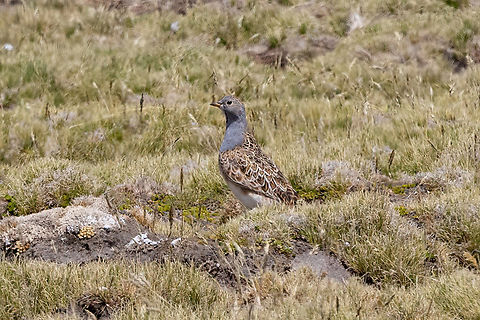
Appearance
The grey-breasted seedsnipe is 19 to 24 cm long and weighs 96 to 140 g . The male has a gray head, neck, and upper breast, and a white throat with a black border. Its upperparts are cinnamon buff in a vermiculate pattern. The wings show white bars above and below in flight. The lower breast and belly are white; a narrow black band separtes them from the upper breast. The female's head and breast are pale buff with heavy dark streaks. The two subspecies are essentially alike though ''T. o. ingae'' has shorter wings and legs than the nominate.Distribution
The grey-breasted seedsnipe is a bird of the Andes. ''T. o. ingae'' is found from the Department of Cajamarca in Peru through western Bolivia into northern Chile and northwestern Argentina as far as Catamarca and possibly Mendoza Provinces. The nominate subspecies is found from northern Chile's Antofagasta Region and northwestern Argentina's La Rioja Province south into Tierra del Fuego. It is a year round resident in most of its range though it moves north out of Tierra del Fuego in winter. It also makes seasonal altitudinal movements.The grey-breasted seedsnipe inhabits Puna grassland, mostly in areas with low matted vegetation or short grass near bogs. In Peru it is common between 3,400 and 5,000 m elevation. Further south it mostly breeds above 1,000 m but can be found in summer below 400 m in Chilean Patagonia.
Status
The IUCN has assessed the grey-breasted seed-snipe as being of Least Concern. Its population is estimated at between 6700 and 17,000 mature individuals and is believed to be stable. Its large range is generally remote, with little human impact.Habitat
The grey-breasted seedsnipe is a bird of the Andes. ''T. o. ingae'' is found from the Department of Cajamarca in Peru through western Bolivia into northern Chile and northwestern Argentina as far as Catamarca and possibly Mendoza Provinces. The nominate subspecies is found from northern Chile's Antofagasta Region and northwestern Argentina's La Rioja Province south into Tierra del Fuego. It is a year round resident in most of its range though it moves north out of Tierra del Fuego in winter. It also makes seasonal altitudinal movements.The grey-breasted seedsnipe inhabits Puna grassland, mostly in areas with low matted vegetation or short grass near bogs. In Peru it is common between 3,400 and 5,000 m elevation. Further south it mostly breeds above 1,000 m but can be found in summer below 400 m in Chilean Patagonia.
Reproduction
The grey-breasted seedsnipe breeds between October and February. It places its nest in a clump of grass or other vegetation, usually near water. The clutch size is four eggs.{| cellpadding="2" cellspacing="0" style="background-color:#f6f6f6"
|- style="vertical-align:middle;"
| style="line-height:50px;vertical-align:middle;text-align:center;" |
| style="vertical-align:middle;line-height:2;" |
Songs and calls
|}
Food
The grey-breasted seedsnipe is usually seen singly or in small family groups. It feeds on the buds and leaves of herbs and succulent plants.References:
Some text fragments are auto parsed from Wikipedia.